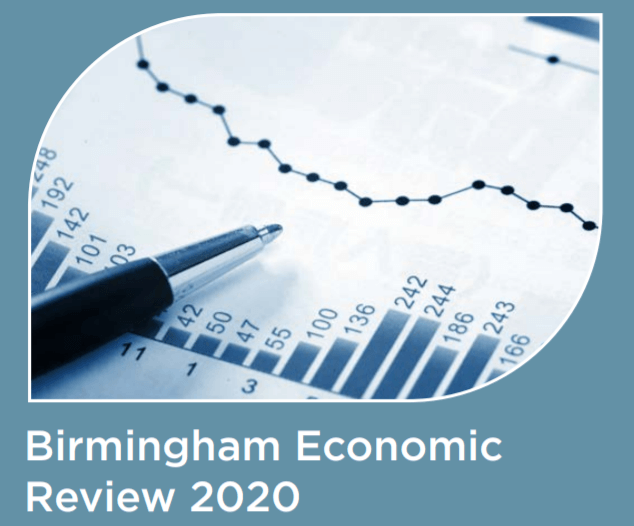
Before the pandemic, Birmingham’s Economy was growing healthy. Ben Brittain discusses the massive impact that Coronavirus has had on the City’s economy and the road to recovery.
This blog post has been produced to provide insight into the findings of the Birmingham Economic Review.
The Birmingham Economic Review 2020 is produced by City-REDI / WM REDI, University of Birmingham and the Greater Birmingham Chambers of Commerce, with contributions from the West Midlands Growth Company. It is an in-depth exploration of the economy of England’s second city and is a high-quality resource for organisations seeking to understand Birmingham to inform research, policy or investment decisions.
This post is featured in the full report and report summary here.
Before the emergency health crisis and subsequent government imposed lockdown, Birmingham’s economy was growing healthily.
In 2018 Birmingham total GVA was £29bn, followed by the next highest, Solihull, at £9.8m, and Coventry at £9.5m. GVA across the Greater Birmingham and Solihull area has increased by 4.5%, compared to the UK (2.7%) and English (2.5%) change on last year.
In 2018, GVA per hour was £32.7 in the WMCA (3 LEP) area, an increase of 3.8% (+£1.2) from 2017 which is above the UK average increase of 2.2% (+£0.7). Whilst GVA per head lags behind the English average, it was growing substantially and making up the dividing ground.
Growth was the watchword for the city.
The pandemic has set back that progress with a steep and sharp shock. KPMG has forecast that the consequence of the pandemic will cause the West Midlands region to contract by 9.1% in 2020, compared to wider UK contraction of 7.2%.
The data we have available shows that when compared to June 2020, monthly national GDP had risen by 6.6% in July 2020. However, GDP was 11.7% below the levels seen in February 2020.
The Monthly Business Survey (MBS) returns and other external data (including comments from 9,500 businesses) shows that after the easing of social distancing and lockdown measures businesses were reporting a continual increase in output due to an increase in demand.
With the ease of lockdown measures, consumer and client demand has resumed, stimulating the economy and supporting the hospitality sector. Since lockdown measures were eased, the NatWest Markit Purchasing Managers Index (which surveys businesses across the region) has suggested that the economy is growing and regaining lost ground.
The resumption of business activity has created some cause for optimism.
The UK government’s lockdown restrictions caused significant economic harm. GDP fell substantially and output fell off a cliff. The fall was historic. But as Birmingham and the rest of the UK has emerged from the pandemic and lockdown measures eased, output has grown as has growth and business confidence. Regional PMI has registered at historical highs for two consecutive months now, indicating a strong rebound in quarter 3 for the region and the wider national economy.
This blog was written by Ben Brittain, Policy and Data Analyst, City-REDI / WM REDI, University of Birmingham.
To sign up for our blog mailing list, please click here.
Disclaimer:
The views expressed in this analysis post are those of the authors and not necessarily those of City-REDI / WM REDI or the University of Birmingham
